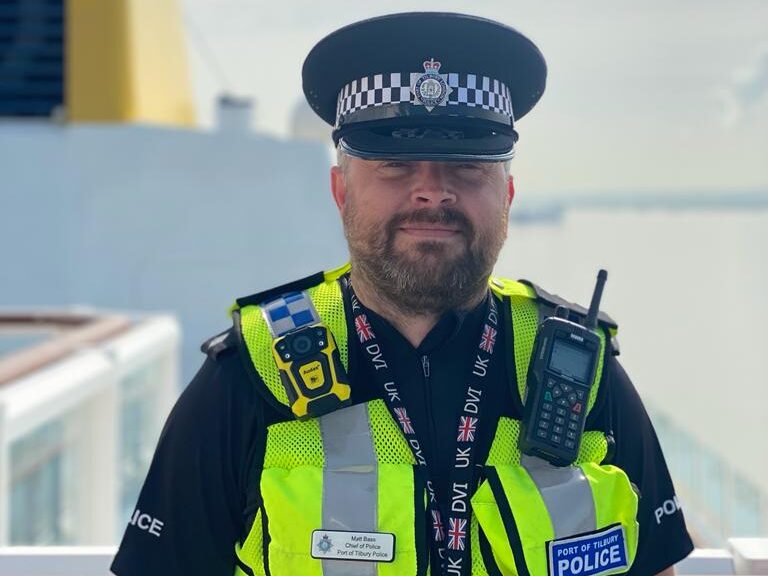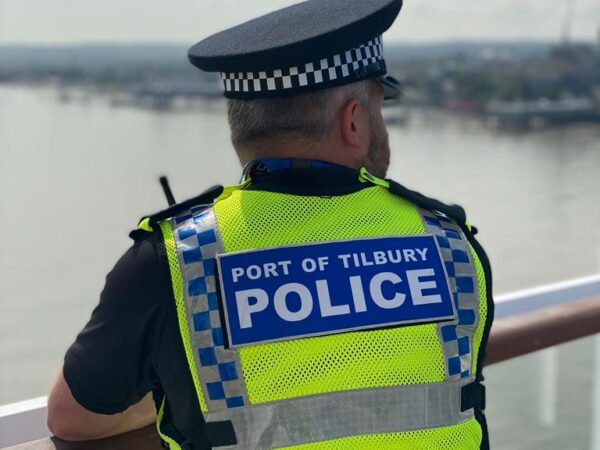Matt Bass is the Chief of Police at the Port of Tilbury. He’s been in the police for 20 years and has kindly taken some time out of his busy day to let us know how important clear and concise communication is in the port industry and the variety of things he may have to deal with on any given day. This is his story.
The end of September 2023 marked my twentieth year as a Police Officer, an important milestone for me personally and the chance to reflect back over two decades of Police Service. Throughout my career I have seen many changes in the way we Police in the United Kingdom, from the introduction of more advanced technology with officers carrying hand held devices allowing them to access a wealth of information at the touch of a button, to the routine carrying of personal protection equipment such as a Taser. But what hasn’t changed over that time is the importance of effective communication, being able to communicate effectively remains the most important tool in a Police officer’s tool box.
In my role as Chief of Police at the Port of Tilbury London Police, I communicate every day with a variety of people, whether that is my team, Port managers and staff, stakeholders and tenants, members of the public or the crew of vessels visiting the Port of Tilbury. Policing offers many challenges and policing a specialist environment such as a Port has its own unique challenges which makes effective communication even more vital. Whether that is obtaining information about an ongoing emergency so we can provide a suitable and effective response, dealing with someone who is in mental health crisis or speaking with a victim of crime who may be distressed, frustrated or angry we must adapt our communication style to be the most suitable given the circumstances we are faced with. There are many other factors to consider in my specific area of responsibility, such as a language barrier when dealing with seafarers visiting from abroad who may not speak English, or trying to decipher jargon, I have worked at the Port of Tilbury now for 13 months, but I still learn new jargon and port specific words every single day.
So what does that effective communication look like in practice? In March 2023 an email was received from a ships agent working on behalf of a vessel due to arrive at the Port of Tilbury. The email alerted us to a serious medical emergency on board the vessel where two seafarers had sustained serious and substantial burns to their face, body and arms. That early communication allowed for an immediate and effective response by the Port Police, and early communication with the East of England Ambulance Service. The triage process could be carried out before the arrival of the vessel and after supplying images of the burns injuries to the Ambulance Service, resources including the Helicopter Emergency Medical Service HEMS were dispatched to meet the vessel on its arrival. Police officers and Paramedics boarded the vessel once it was berthed and provided emergency medical care to the seafarers. Further communication with staff from the terminal allowed for an area to be cleared and made available to the pilot of the HEMS aircraft to land if required. Both injured seafarers were later conveyed by land ambulance to the specialist burns unit at Broomfield Hospital where they recovered from their injuries. The early notification of this incident, to my department by the ship and ships agent allowed for a rapid response to what was a serious medical emergency, and promoted the recovery of the injured crew members.
In June 2023 I was notified by the Ships DR and medical team on board a cruise ship of the unfortunate death of a passenger while the ship had been at sea. The ship was not due to arrive back at the London International Cruise Terminal, Tilbury for a couple of days, but again this early notification allowed for the Port Police department to begin planning an effective response. I was able to liaise with His Majesty’s Coroners Service for Essex to begin the process of formal identification of the deceased, notification to the next of kin and planning the recovery of the deceased from the vessel on its arrival. When the ship arrived into Tilbury myself and one of my officers boarded the ship and spoke with the ships security officer who is our usual point of contact on a cruise vessel. We were shown to the ships hospital where we spoke with the medical team there to begin our investigation and to collate any medical records and reports and confirm the circumstances of the death. I made sure throughout that the ships medical team knew which processes we needed to carry out, and how they could assist us and in turn the crew were able to provide vital information about the deceased passenger and any interactions which had taken place before they had sadly died. Formal identification was carried out by a friend of the deceased and we were then ready to move the deceased to a waiting undertaker’s vehicle, as I coordinated this part of the recovery, effective communication became absolutely vital to ensure the deceased could be safely moved from the vessel to the quayside in a dignified and respectful way.
So what were the key factors in these incidents? For me it was the presence of a clear line of communication, which the ship or their agent were fully aware of and this allowed them to notify the Port Police of an incident before the vessel had even arrived. But it’s not always that straightforward, and there are certainly differences depending on the vessel type. A cruise vessel which visits the Port of Tilbury on a very regular basis will know that the Port has its own Police force and how to contact us, but a smaller commercial vessel, maybe visiting Tilbury for the first time, may not.
Time is often of the essence and sometimes every second matters, so having established methods for communication is absolutely essential. Getting the right information quickly is also so very important, in Policing we use the THRIVE or ‘Threat, Harm and Risk’ model when recording incidents and dispatching resources. The THRIVE model allows our Police call handlers to assess information received, clarify and obtain more information when required, and decide on the best response to an incident.
But general ‘day to day’ communication is just as important, my team patrol the Port 24/7, 365 days a year, and one of the best tools at their disposal is simply the power of ‘Hello’. Speaking to staff, stakeholders, members of the public, tenants and seafarers helps to build trust and confidence in the Port Police. It is the best way to understand what is going on within the Port, to understand if there are any concerns or issues, or where our time can be best spent to have the biggest impact. We live in a digital age where technology has enhanced so many parts of our lives, but now and again, it’s nice just to have a chat.
Join Us
Find out more about the benefits of being a PSS member and how to apply.


